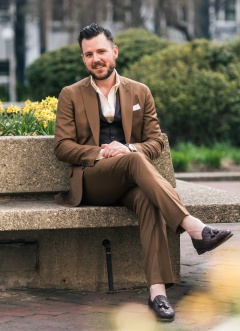Columbia College | Columbia University in the City of New York
“The Age of Influencers,” by Dan Trepanier ’09
I have a unique perspective on “influencers,” formerly known as bloggers.
I was one of the first bloggers in the “business.” I started a men’s fashion blog, Articles of Style, from the KDR fraternity house in 2009, before blogging became a career goal and social media was relatively new — no one on Facebook was concerned about privacy, Twitter wasn’t yet presidential and Instagram was still just a twinkle in its founder’s eye.
But after spending a few years selling advertising in the form of product placements and “sponsored content,” I couldn’t stomach it any longer. As someone who started blogging out of a passion for unfiltered creative writing (and feeling tired of big-business magazines that pigeonholed men’s fashion), it was unsettling that the only road to monetization was to copy and paste scripted messages from major corporate brands.
So I transformed my website into an e-commerce brand that specializes in luxury custom menswear. This unlocked an immediate sense of freedom; now I could keep my message consistent and make money directly from my followers, rather than changing my message regularly in order to get paid by outside advertisers.
The irony, of course, is that I crossed over to the other side. Now I receive two to three messages every day from “influencers” asking, sometimes begging to “collaborate” (i.e., “pay me to post your product”).
Indeed, influencers have become so prevalent that today thousands of otherwise talented people spend most of their days doing outreach to brands seeking a paid mention, or a free product, or anything they can get to continue on their path to becoming a full-time social media model.
We don’t pay influencers to promote our brand, but the sheer volume of emails and direct messages we receive from aspirants all over the world is astonishing. From my perspective, “influencer” has become the new dream job. Many young people look up to their favorite social media stars, and aspire to be a full-time social media poster themselves, mainly because this is a method to achieve money with as little traditional “work” as possible.
I remember when I was young, I looked up to guys like Michael Jordan and Steve Jobs not because they didn’t work, but because they worked extraordinarily hard. They put in countless hours behind the scenes to develop incredibly specialized skills that would separate them from everyone else. They became great. They built brands and businesses that changed the world, and their legacies will live on long after they are gone. That was my dream — to work hard and build something great. I knew it was difficult — and that was the point.
Kim Kardashian is the new Michael Jordan — and that scares the shit out of me.
I was taught that there is a natural satisfaction and fulfillment that comes from working hard, taking on responsibility and bearing the heaviest burden that you can. Perhaps it’s because I was raised on a farm in Canada, or perhaps it was because I was a competitive athlete, or perhaps it was because I didn’t grow up with an iPhone.
This is why I feel concerned when I see this type of young person — one who takes on a minimal amount of personal responsibility and makes a living from posting whatever brand message pays them the most dollars. From what I’ve learned, this is not a recipe for a fulfilling life. In fact, it’s the opposite. Life is not about taking it easy and changing your message regularly. Fulfillment comes from accomplishing difficult things, sticking to your own mission, growing as a person and ultimately becoming someone who can help others do the same.
Ask anyone who is rich — money does not fulfill you. Ask anyone who is famous — fame does not fulfill you. So why would a job that is only about money and fame be an aspirational goal? It’s hard for me not to wonder if the rise of anxiety and depression in younger people is not connected to this phenomenon; competing to attract the most “likes” by putting in the least effort, like lifestyle bloggers who “live on vacation.”
Pre-social media, there was the old concept of “living the dream”: to sit on a beach all day and drink Piña Coladas. The problem is, in reality, most people, after sitting on a beach for a few days, weeks, months, begin to feel less and less valuable both to society and to themselves. And this feeling of uselessness would quickly begin to outweigh the feelings of comfort from sitting on a beach.
So my question to the aspiring influencers out there is: What impact are you looking to have on the world while you are here? And what legacy are you hoping to leave behind when you go? You can’t post pictures from the grave, but your message and your work can continue to have an impact after you are gone if you work really, really hard.


